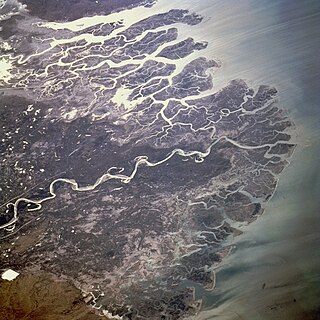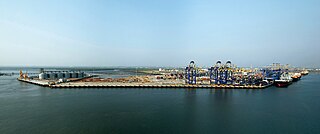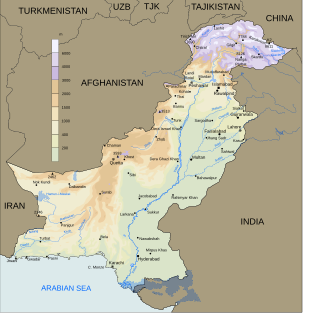Related Research Articles

Transport in Pakistan is extensive and varied, and serves a population of over 212.2 million people. In recent years, new national highways have been built, with the addition of motorways which have improved trade and logistics within the country. Pakistan's rail network owned by Pakistan Railways is also undergoing expansion in recent years. Airports and seaports have been built with the addition of foreign and domestic funding. Transportation challenges in developing countries like Pakistan are escalating due to poor planning, inadequate governance, and corrupt practices. Consequently, these nations are grappling with a significant crisis in their transportation systems.

The Indus River Delta forms where the Indus River flows into the Arabian Sea, mostly in the southern Sindh province of Pakistan with a small portion in the Kutch Region of India. The delta covers an area of about 41,440 km2, and is approximately 210 km (130 mi) across where it meets the sea. The active part of the delta is 6,000 km2 in area (2,300 sq mi). The climate is arid, the region only receives between 25 and 50 centimetres of rainfall in a normal year. The delta is home to the largest arid mangrove forests in the world, as well as many birds, fish and the Indus dolphin.

Hub Dam is a reservoir on the Hub River. It is situated 56 km from Karachi city in Karachi and Hub District on Sindh and Balochistan provinces border. The dam is extended to 24300 acres with gross storage capacity of 857000 acre feet. It is Pakistan's fifth-largest dam. It is an important source that provides the drinking water to the metropolitan city Karachi.

The Port Muhammad Bin Qasim, or Qasim Port Authority, also known as Port Qasim, is a deep-water seaport in Karachi, Sindh, Pakistan, on the coastline of the Arabian Sea under the administrative control of the Secretary to the Government of Pakistan for Maritime Affairs. It is Pakistan's second busiest port, handling about 35% of the nation's cargo. Port Qasim and Karachi Port, the busiest port of country, together handle more than 90% of all external trade of Pakistan.

The Port of Karachi is one of South Asia's largest and busiest deep-water seaports, handling about 60% of the nation's cargo located in Karachi, Pakistan. It is located on the Karachi Harbour, between Kiamari Azra Langri, Manora, and Kakapir, and close to Karachi's main business district and several industrial areas. The geographic position of the port places it in close proximity to major shipping routes such as the Strait of Hormuz. The administration of the port is carried out by the Karachi Port Trust, which was established in 1857.

Diamer-Bhasha Dam is a concreted-filled gravity dam, in the preliminary stages of construction, on the River Indus between Kohistan district in Khyber Pakhtunkhwa and Diamer district in Gilgit Baltistan, Pakistan administered Kashmir. Its foundation stone was laid by the then Prime Minister of Pakistan in 1998. The dam site is situated near a place called "Bhasha", hence the name which is 40 km downstream of Chilas town and 315 km from Tarbela Dam. The eight million acre feet (MAF) reservoir with 272-metre height will be the tallest roller compact concrete (RCC) dam in the world.
The Keti Bandar Port is a port on the Arabian Sea, in the Thatta District, Sindh, Pakistan. Keti Bandar is approximately 150 highway kilometers from Karachi, with a driving time of around 3.5 to 4 hours. Two of the larger towns on the route from Karachi to Keti Bandar are Gharo and Mirpur Sakro.

The ongoing pollution of the Ganges, the largest river in the Indian subcontinent, poses a significant threat to human health and the environment. The river, which is severely polluted with human waste and industrial contaminants, provides water to about 40% of India's population across 11 states, serving an estimated population of 500 million people, more than any other river in the world.

Fishing in India is a major sector within the economy of India contributing 1.07% of its total GDP. The fishing sector in India supports the livelihood of over 28 million people in the country, especially within the marginalized and vulnerable communities. India is the third largest fish producing country in the world accounting for 7.96% of the global production and second largest producer of fish through aquaculture, after China. The total fish production during the FY 2020-21 is estimated at 14.73 million metric tonnes. According to the National Fisheries Development Board the Fisheries Industry generates an export earnings of Rs 334.41 billion. Centrally sponsored schemes will increase exports by Rs 1 lakh crore in FY25. 65,000 fishermen have been trained under these schemes from 2017 to 2020. Freshwater fishing consists of 55% of total fish production.
The city of Karachi is a major transport hub of Pakistan. The Karachi port and airport are major gateways to Pakistan. The Karachi Railway stations transports the major part of Pakistan's trade with other countries.
Drinking water supply and sanitation in Pakistan is characterized by some achievements and many challenges. In 2020, 68% Pakistanis, 72% Indians, 54% Bangladeshi had access to the basic sanitation facilities. Despite high population growth the country has increased the share of the population with access to an improved water source from 85% in 1990 to 92% in 2010, although this does not necessarily mean that the water from these sources is safe to drink. The share with access to improved sanitation increased from 27% to 38% during the same period, according to the Joint Monitoring Program for Water Supply and Sanitation. There has also been considerable innovation at the grass-root level, in particular concerning sanitation. The Orangi Pilot Project in Karachi and community-led total sanitation in rural areas are two examples of such innovation.

The Pakistan Water & Power Development Authority is a government-owned public utility maintaining power and water in Pakistan, although it does not manage thermal power. WAPDA includes Tarbela and Mangla dams among its resources. Its headquarters are in Lahore.

Tharparkar, also known as Thar, is a district in Sindh province in Pakistan, headquartered at Mithi. Before Indian independence it was known as the Thar and Parkar (1901–1947) or Eastern Sindh Frontier District (1882–1901).

Fishery and fishing industry plays a significant part in the national economy of Pakistan. With a coastline of about 1,120 km, Pakistan has enough fishery resources that remain to be developed. Most of the population of the coastal areas of Sindh and Balochistan depends on fisheries for livelihood. It is also a major source of export earning.
Renewable energy in Pakistan is a relatively underdeveloped sector; however, in recent years, there has been more and more interest to explore renewable energy resources for the energy production. Around 10.57% of Pakistan’s total installed power generation capacity comes renewables. Most of Pakistan's renewable energy comes from hydroelectricity. As per the vision of the Prime Minister, there is the aim to “induct 20% of RE by the year 2025 and 30% of RE by the year 2030.”

Mubarak Goth or Mubarak Village is a fishing village in Kiamari Town in Karachi, Sindh, Pakistan. It is located along the shore of Arabian Sea in Keamari District.
The Engro Thar Coal Power Project (Thar-ll) is a coal-fired power plant developed as part of the China–Pakistan Economic Corridor by Sindh Engro Coal Mining Company and China Machinery Engineering Corporation in the Thar Block-II of the Thar Coalfield, Tharparkar District, Sindh, Pakistan 25 kilometers from the town of Islamkot near the village of Singharo-Bitra.
Malir Expressway is a 39 km under construction expressway starting from KPT Interchange, passes through Qayyumabad and conclude at the Karachi-Hyderabad Motorway near Kathore, along the Malir River in Karachi, Pakistan. One of the major infrastructure developments in Karachi city which is unviable for the provincial government and detrimental to the city's climate. It was announced that half of it will be opened on 14 August 2023 which has been indefinitely delayed since the Asian Development Bank has withdrawn the funding for the construction ADB decides against financing Karachi’s Malir Expressway; as of right now there is illegal excavation happening on the Malir River bed and the fields of Malir; it is unlikely that Expressway will be completed given the litigation and damage to the only surviving river in Karachi.
Sindh Barrage is a proposed project in Sindh, Pakistan that will be constructed on the River Indus in between the Kotri Barrage and the Indus River outfall into the Arabian Sea.
References
- ↑ "Work on Sindh Coastal Highway will start soon – Business Recorder".
- ↑ Khawaja, Ghulam Hussain (July 3, 2023). "Rs8.5bn approved for phase-II of coastal highway project". DAWN.COM.
- 1 2 Masood, Iqra (July 3, 2023). "Funds for Phase II of Coastal Highway project- Zameen News". Pakistan Real Estate News & Pakistan Property News & Latest Updates - Zameen News.